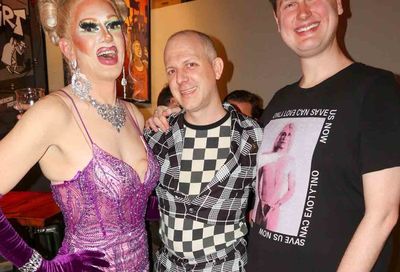Federal Appeals Judges Consider Whether DOMA Is Constitutional in Historic Hearing in Boston
[Photo, above: Gay & Lesbian Advocates & Defenders lawyer Mary Bonauto, left, apeaks with reporters along with Massachusetts Attorney General Martha Coakley (D), right, and her Civil Rights Division chief, Maura Healey, outside the John Joseph Moakley U.S. Courthouse in Boston on April 4, 2012. Photo, below: The Gill case plaintiffs outside the John Joseph Moakley U.S. Courthouse in Boston on April 4, 2012. (Photos by Chris Geidner.)]
At points in today’s appellate arguments over the constitutionality of the federal definition of marriage contained in the Defense of Marriage Act, the four lawyers arguing the two cases to three judges appeared to be operating from different worlds. One of the only points of complete agreement was that DOMA was an unprecedented attempt by Congress to define marriage across all federal laws.
Whether arguing over the rationales advanced for DOMA’s passage, the level of scrutiny from which courts should review laws that classify people based on sexual orientation, or the impact of Section 3 of DOMA on married gay and lesbian couples, the gulf between the lawyers at times prevented the sort of fireworks one might expect at a debate over a hot-button issue like “gay marriage,” as it was called when DOMA was passed in 1996.
In a somewhat surprising move, the Department of Justice went a step further than it has in the past when Acting Assistant Attorney General Stuart Delery told the U.S. Court of Appeals for the First Circuit today that DOJ would not be defending the constitutionality of the 1996 law regardless of the level of scrutiny the court found appropriate for reviewing a law like DOMA that classifies people based on sexual orientation.
[ADDITIONAL COVERAGE:
- Metro Weekly‘s preview of today’s argument
- Metro Weekly‘s interview with plaintiff Dean Hara, the surviving spouse of former Rep. Gerry Studds
- Partial audio of today’s argument (mp3 from the court)]
Delery, representing the federal defendants in the two cases, Gill v. Office of Personnel Management and Massachusetts v. United States, was in the unusual position of agreeing with the plaintiffs on most points because of President Obama’s February 2011 decision that Section 3 of DOMA is unconstitutional because such laws should be subjected to heightened scrutiny and that, accordingly, DOJ would stop defending DOMA in court.
The head of Department of Justice’s Civil Division, Delery told Chief Judge Sandra Lynch and Judges Juan Torruella and Michael Boudin today that Congress’s intent to single out gay and lesbian couples for discrimination was clear from the name of the bill itself: “It’s a defense against something, and that defense was [against] same-sex couples.”
As to the DOJ’s prior position that DOMA should be found constitutional if subjected to the lowest level of scrutiny — known as rational basis — Delery noted that DOJ’s prior briefs defending the law were superseded by its more recent filings and, hence, no longer the government’s position. Specifically asked by Judge Boudin whether the law should be upheld under rational basis review, Delery said, “I’m not here to defend it on any basis.”
When Paul Clement, representing the House Republican leadership-controlled Bipartisan Legal Advisory Group, made his case defending DOMA, he pointed to the “uniqueness of the dynamic that Congress was facing in 1996” — when Hawaii courts were considering whether same-sex couples were required to be allowed to marry under Hawaii law. Clement argued that Congress had a rational basis to act to “preserve its prior legislative judgments” by, in anticipation of a change in Hawaii law, preventing any federal recognition of same-sex marriage.
 Clement also argued that, in accepting states’ marriages for federal purposes prior to DOMA, there was both “uniformity” in the provision of federal benefits and “deference” to states’ decisions about marriage — but that the pending Hawaii decision at the time justified the congressional action in deciding to choose uniformity over deference.
Clement also argued that, in accepting states’ marriages for federal purposes prior to DOMA, there was both “uniformity” in the provision of federal benefits and “deference” to states’ decisions about marriage — but that the pending Hawaii decision at the time justified the congressional action in deciding to choose uniformity over deference.
Gay & Lesbian Advocates & Defenders lawyer Mary Bonauto, representing the plaintiffs who brought the Gill lawsuit arguing that DOMA Section 3’s federal definition of marriage violates constitutional equal protection guarantees, disagreed, telling the court, “The one constant of marriage law has been change.”
Noting that even as states across the country disagreed in the past on whether interracial marriages should be recognized, “the federal government never weighed in for or against.”
Bonauto went on to discuss how Clement’s argument about uniformity didn’t make sense to GLAD, stating, “Of course there’s uniformity, but what is the reason for singling out one group? That’s the question BLAG does not answer.”
In his rebuttal argument, Clement did not directly respond to that, instead focusing on making the more general case that DOMA isn’t an anti-gay law. Although DOJ, the Commonwealth of Massachusetts and GLAD argues that DOMA was motivated by anti-gay sentiment — “animus,” in court lingo — Clement argued that the impact of DOMA was not all bad.
“In some cases,” he said, “it’s a net financial benefit to the same-sex couple; in some, it’s not.”
Maura Healey, the head of the Massachusetts Attorney General’s Office’s Civil Rights Division, had made the opposite case in her time before the judges, arguing that, for Massachusetts residents, DOMA mandates the creation of “two different, unequal” types of marriage — one for opposite-sex couples and another lacking in all federal recognition for same-sex couples.
Chief Judge Lynch, however, noted that Clement had earlier said that Section 2 of DOMA — not at issue in today’s case — allows Massachusetts to do what it wants with regards to same-sex marriage and that, in Massachusetts’s challenge to DOMA, Clement would say the Commonwealth is trying to make Massachusetts law drive federal policy.
Healey responded, “What that view requires is ignoring our nation’s history,” which always included that deference; “our jurisprudence history,” which she said recognized the role of states in formulating marriage law; and “our congressional history,” which she said shows Congress’s awareness prior to 1996 of that state role.
In arguing that DOMA is unconstitutional under the Spending Clause, which is partially related to the Gill equal protection claim, and the Tenth Amendment, which protects state sovereignty, Healey faced opposition from Clement for BLAG on both points and Delery for DOJ on the Tenth Amendment claim.
In fact, one of the only points of agreement among the counsel appearing today was that DOMA represents an unprecedented attempt by the federal government to create a broad definition of marriage that applies across all federal law.
When Judge Torruella asked Clement if it was relevant that DOMA was, as Clement had put it, the “first comprehensive attempt” at such a definition, Clement said no — pointing to the fact that, in his view, DOMA was “not in any way an effort to override states.”
He even acknowledged at one point, “The federal government isn’t in the business of having its own marriage certificates.”
Although the debate over the level of scrutiny to be applied to sexual orientation classifications was front and center today, Clement also made an argument that a prior case heard by the First Circuit regarding the constitutionality of “Don’t Ask, Don’t Tell” — Cook v. Gates — foreclosed the question by concluding that rational basis should apply.
Delery, referencing earlier DOJ filings in today’s cases, stated that DOJ’s preference is that the full court reconsider that decision from the Cook opinion by considering these cases en banc or that the three-judge panel take action, if possible, that would “allow the panel to accomplish that through other means.”
Regardless of that decision — and especially in light of DOJ’s statement today that it will not defend DOMA even if considered under rational basis review — GLAD’s lawyers and Massachusetts’s lawyers have made arguments to the court that DOMA should be struck down as unconstitutional under rational basis.
Although the judges didn’t tip their hand today as to the outcome of the case, Clement’s goal today was to convince the judges otherwise. And, if he failed to do that, Clement ended his argument by noting the great strides that have been made by gay and lesbian people in the political process and suggesting that there was “another path than constitutionalization” of the issue — deferring to the political branches.
For his part, Delery made the strongest suggestion of the anticipated road ahead for these cases, regardless of the decision from today’s argument.
In closing, Delery quoted at length from Supreme Court Justice Anthony Kennedy’s opinion in Lawrence v. Texas, in which a split court held almost a decade ago that sodomy laws are unconstitutional. Referencing Clement’s arguments about Congress’s reasons for passing DOMA, Delery told the judges today that Kennedy held then that “times can blind us to certain truths and later generations can see that laws once thought necessary and proper in fact serve only to oppress. As the Constitution endures, persons in every generation can invoke its principles in their own search for greater freedom.”
Telling the court that gay and lesbian people, living “open and honest lives,” have invoked those principles in this case, Delery said that the president and attorney general have done the same and urged the court to do so as well.
Support Metro Weekly’s Journalism
These are challenging times for news organizations. And yet it’s crucial we stay active and provide vital resources and information to both our local readers and the world. So won’t you please take a moment and consider supporting Metro Weekly with a membership? For as little as $5 a month, you can help ensure Metro Weekly magazine and MetroWeekly.com remain free, viable resources as we provide the best, most diverse, culturally-resonant LGBTQ coverage in both the D.C. region and around the world. Memberships come with exclusive perks and discounts, your own personal digital delivery of each week’s magazine (and an archive), access to our Member's Lounge when it launches this fall, and exclusive members-only items like Metro Weekly Membership Mugs and Tote Bags! Check out all our membership levels here and please join us today!

-thumb-500x375-2491.jpg)


















